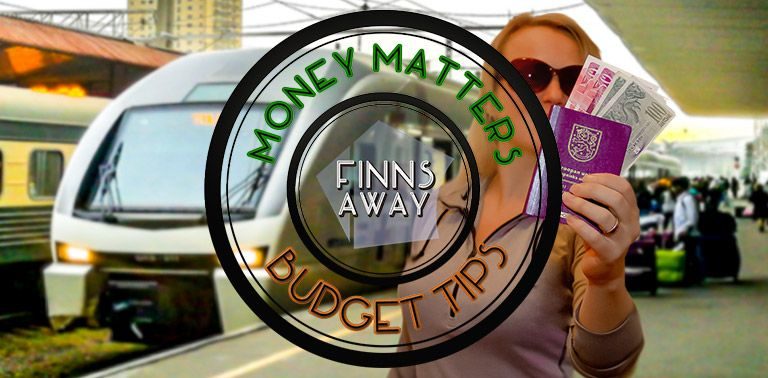
Tips for traveling on a budget
Traveling and living abroad always requires money, that’s for sure, but it doesn’t have to be awfully expensive. In fact, it’s possible to live on a small budget almost everywhere, also in Europe. People often are ready to spend quite a lot of money when on holiday trips, and there’s nothing wrong with that. When on a short vacation, saving money is secondary to having a good time and relaxing, but such traveling style is suitable only for short term. Budget control and minimizing costs comes important especially when on longer trips, or when traveling for a lifetime.
When writing this post, we have been on the road for almost 1,5 years already, and managed to travel with relatively low budget, even if we have stayed mostly in Europe. Our average daily budget has been under 40 euros for the two of us, so we know a thing or two about budget traveling. In this post we provide tips on how to downsize your travel costs, both when planning the trip and when on the road.
Set a budget target and follow it
When there is limited amount of money in use for traveling, the first step is to plan your travel budget. To do that, start with thinking about how much you are willing, or able, to spend in one week or one month, depending on the length of your trip. Then divide that sum to get your daily budget target. For example, if you are thinking about a month on a road and you could use 1 500 €, that divides down to roughly 50 euros per day.
When estimating the costs of your trip, don’t forget to take into account traveling costs, like flight and train tickets. So what if you have this 1 500 € in use for the whole trip, not just for daily costs on the road? Let’s say that your flights and possible other transportation tickets cost roughly 500 €. That would leave you with 1 000 euros in use for the month, so roughly 33 € per day for living, including accommodation and food, and for other costs like entrance tickets and going out.
To follow the daily budget, keep a record of your expenses. That really helps to see where the money vanishes, and how you can tighten the belt if needed. To make this work, you’ll need to record also the smallest purchases that might feel unimportant. You could write the costs down in a notebook, or use apps available for that purpose. We use a notebook for daily purchases, and then collect them in an excel file every once in a while. Writing down your purchases is not useful only when traveling, but also when at home and saving money for the next trip.
Pay close attention to accommodation costs
Even if you are already using hostels and other “inexpensive” options, there can be huge variety in prices. Low price does not necessarily mean poor quality, so compare carefully! We have managed to keep our accommodation costs pretty low, using Booking.com and Airbnb for searching apartments, rooms in guesthouses and hostels. Before rushing to booking phase, think about your criteria. Are you willing to stay in dorms, which usually is the cheapest option especially for solo travelers? Do you need a room with kitchen, for making at least part of the meals yourself? Can you stay outside of the city center or beach area, where accommodation often is cheaper? Also remember to check if the area can be reached using public transportation.
If you are on a shoestring and adventurous enough, consider also camping! In many countries you can find camping areas also surprisingly close to big cities, and next to bus stops. Bringing your own tent is the cheapest option of course, but sometimes there also are affordable cabins or rental tents available in camping sites. If you are considering sleeping in a tent, make sure that the weather is warm enough for your gear, since not all sleeping bags, tents and pads are suitable for all temperatures. Then again, if you don’t have any camping gear, buying everything is a big investment, and quite heavy weight to carry, unless you buy the lightest and most expensive gear. There are also some possibilities for free accommodation, like couch surfing, and during longer trips you could also consider house-sitting or volunteering.
Utilize kitchen facilities and cook your food
Eating out raises the travel expenses, even in countries where it feels cheap to buy meals and drinks in restaurants or street stalls. If you want to save money, or are on a tight budget, prepare your meals whenever there is a guest kitchen available, and also pick such accommodation options that have one. For buying groceries, consider heading to local markets, where you can find fresh veggies and fruits, among other things. For cooking tasty meals you also need some spices; those can be bought everywhere, but consider carrying small amounts of basic spices with you. Hostel and apartment kitchens often even have some basic stuff like salt, sugar and oil free for using.
When traveling longer term, cooking is not just a way to save money, it’s also a healthier choice than eating out every day. To save money, you could also consider buying some cheap eats and street food in stead of going to restaurants, but those usually are unhealthy options and lack vitamins. And, believe it or not, it’s fully possible to get tired of eating out. When just on a short vacation this rarely is the case though.
Be aware of the prices of drinks
Alcohol often is cheaper in holiday destinations, than in your home country (at least if you are from Finland, haha), but few drinks out can still quickly cost more than your accommodation for a night! So if you want to save some money, avoid buying too many beers from restaurants and pubs, and carefully check the prices of drinks. To avoid negative surprises, never order anything without knowing the price beforehand. We are nowhere near teetotalers, but never buy expensive cocktails and choose the house wine over bottled wine in restaurants. I suppose tasting craft beers is our sin, since those are always more expensive than basic lager beer.
Also other drinks than alcohol can raise your costs quite a lot. Bad news for those who favor take-away coffee; coffee is expensive almost everywhere, and take-away special coffee can be the most pricey option! For your morning dose of caffeine, check if there is some kind of coffee machine or at least a kettle in your accommodation place, and consider buying instant coffee. Another thing is water; check weather it’s OK to drink tap water in your destination. Bottled water is, besides an unnecessary cost, also an environmental problem.
Walk or use public transportation
Using taxi might be cheap in your destination, but still it surely costs several times more than a local bus. Especially when in an airport, looking for transportation to the city, always use the same option than the locals do. Dedicated airport taxi/bus/train often is the easiest and fastest option, but can be really expensive. Usually there is also a local bus service to the city center available.
When using train, especially night trains, consider using the cheapest class. First class tickets can be at least twice as expensive as third class! We usually choose the cheapest option, and haven’t had any problems. Most of the train carriages have been very clean and comfortable, and in third class, often with open bunk beds, you can also meet locals, not just other tourists. Kind of same rules applies with long distance buses; don’t choose the most expensive tourist bus, instead try to find the option that locals use.
Avoid expensive sights and activities
Sightseeing and special activities are important part of traveling, but when on a tight budget, entrance tickets to those “must-see-sights” can feel way too expensive. Not every sight is worth of paying the ticket, and some actually look much better from the outside than inside. Remember that traveling and exploring the world is not just about sights, adventure tours or organized activities.
Don’t get me wrong, if a hot air balloon ride over some travel destination would be your dream-come-true, you definitely should save up for it, and do it when you have the chance! But finding a true soul and beauty of a travel destination rarely requires expensive activities, rather just roaming around, keeping your mind and eyes open and diving into the local life and culture.
Travel outside the main season
In many popular travel destinations, the main tourism season is actually quite short, often just couple of months. There can be a huge difference in prices between the main season and off-season, especially when it comes to accommodation. Traveling off-season is also a great way to avoid crowds, and to get to see the sights without sharing them with dozens of other visitors. Also, flight tickets can be notably more affordable outside the busiest tourist season.
Read all our cost related posts in Finances page.
Do you have some killer tips on traveling on a budget? Feel free to share them in comments!




